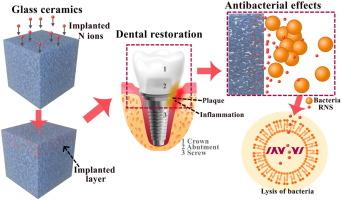当前位置:
X-MOL 学术
›
Appl. Surf. Sci.
›
论文详情
Our official English website, www.x-mol.net, welcomes your
feedback! (Note: you will need to create a separate account there.)
N-induced antibacterial capability of ZrO2-SiO2 glass ceramics by ion implantation
Applied Surface Science ( IF 6.3 ) Pub Date : 2024-11-17 , DOI: 10.1016/j.apsusc.2024.161836 Huasi Zhou, Håkan Engqvist, Olivier Donzel-Gargand, Daniel Primetzhofer, Wei Xia
Applied Surface Science ( IF 6.3 ) Pub Date : 2024-11-17 , DOI: 10.1016/j.apsusc.2024.161836 Huasi Zhou, Håkan Engqvist, Olivier Donzel-Gargand, Daniel Primetzhofer, Wei Xia

|
Periodontal disease caused by bacterial accumulation is a critical issue affecting the longevity of related materials and implants. Enhancing the antibacterial properties of glass ceramics remains a significant challenge. Due to their excellent mechanical properties, ZrO2-SiO2 glass ceramics have shown great potential in dental restoration. Here, to endow ZrO2-SiO2 glass ceramics with antibacterial properties, nitrogen ion implantation was performed to modify their surfaces. The effects of nitrogen fluence on the microstructural, mechanical and antibacterial properties were investigated. The results showed that phase transformation from tetragonal to monoclinic phase occurred after ion implantation. Surface hardening was observed in the sample under the low fluence ion implantation. Partial amorphization and blistering were observed at the highest fluence of 6.0 1017 ions/cm2. XPS analysis revealed that the implanted nitrogen ions mainly form O-Zr-N, N-Si-O and Si-N bonds. Staphylococcus aureus testing showed that the antibacterial properties of ZrO2-SiO2 glass ceramics can be enhanced after implantation, which may be attributed to the formation of reactive nitrogen species. The results show that nitrogen implantation can enhance the antibacterial properties of ZrO2-SiO2 glass ceramics without compromising their mechanical properties.
中文翻译:

离子注入对 ZrO2-SiO2 玻璃陶瓷的 N 诱导抑菌能力
由细菌积累引起的牙周病是影响相关材料和植入物寿命的关键问题。增强微晶玻璃的抗菌性能仍然是一项重大挑战。由于其优异的机械性能,ZrO2-SiO 2 玻璃陶瓷在牙科修复方面显示出巨大的潜力。在这里,为了赋予 ZrO2-SiO 2 玻璃陶瓷抗菌性能,进行了氮离子注入以改性其表面。研究了氮通量对微观结构、机械和抗菌性能的影响。结果表明,离子注入后发生了从四方晶相到单斜晶相的相变。在低通量离子注入下观察到样品表面硬化。在最高通量 6.0 1017 个离子/cm2 处观察到部分非晶化和起泡。XPS 分析表明,注入的氮离子主要形成 O-Zr-N、N-Si-O 和 Si-N 键。金黄色葡萄球菌测试显示,ZrO 2-SiO2 玻璃陶瓷在植入后可增强抗菌性能,这可能归因于活性氮物种的形成。结果表明,氮注入可以增强 ZrO2-SiO 2 玻璃陶瓷的抗菌性能,而不会影响其机械性能。
更新日期:2024-11-18
中文翻译:

离子注入对 ZrO2-SiO2 玻璃陶瓷的 N 诱导抑菌能力
由细菌积累引起的牙周病是影响相关材料和植入物寿命的关键问题。增强微晶玻璃的抗菌性能仍然是一项重大挑战。由于其优异的机械性能,ZrO2-SiO 2 玻璃陶瓷在牙科修复方面显示出巨大的潜力。在这里,为了赋予 ZrO2-SiO 2 玻璃陶瓷抗菌性能,进行了氮离子注入以改性其表面。研究了氮通量对微观结构、机械和抗菌性能的影响。结果表明,离子注入后发生了从四方晶相到单斜晶相的相变。在低通量离子注入下观察到样品表面硬化。在最高通量 6.0 1017 个离子/cm2 处观察到部分非晶化和起泡。XPS 分析表明,注入的氮离子主要形成 O-Zr-N、N-Si-O 和 Si-N 键。金黄色葡萄球菌测试显示,ZrO 2-SiO2 玻璃陶瓷在植入后可增强抗菌性能,这可能归因于活性氮物种的形成。结果表明,氮注入可以增强 ZrO2-SiO 2 玻璃陶瓷的抗菌性能,而不会影响其机械性能。


















































 京公网安备 11010802027423号
京公网安备 11010802027423号